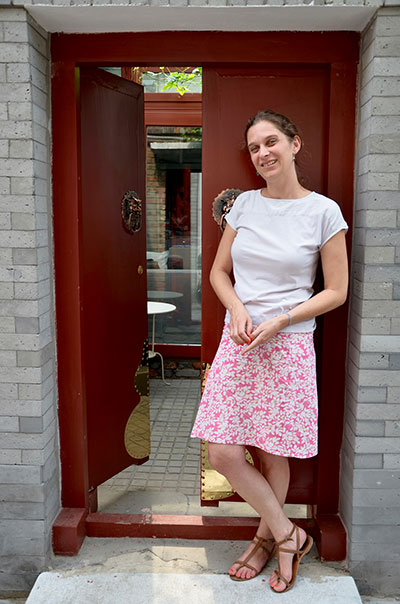Daphne Mallet: More art space can diversify hutong culture
 |
|
Daphne Mallet, owner of the Jiali Gallery at Beijixiang Hutong, has been living in the hutong since 2006.[Photo by Xiong Fangzhou] |
"Art should be in the city center. And I consider hutong as the city center."
Daphne Mallet, owner of the Jiali Gallery at Beijixiang Hutong, has been living in the hutong since 2006. After working in 798 Art Zone for six years, the French artist decided to open her own gallery.
"It [798 Art Zone] became so touristic," Mallet said. "I just want to live in the hutong. So why not open a space in the hutong?"
Hutong Culture
Mallet said she knows her neighbors and is able to make many friends while living in the hutong.
Unlike people who live in the apartment, Mallet says she always keeps her front door open when she home. Sometimes, her neighbors pass by and say hello to her, and , dogs sometimes let themselves in.
"The culture of the hutong is about the relationship with your neighbors," Mallet said, "That is, neighbors know each other for a long, long, long time. And kids grow together, play in the street together. Old people play some games in the street. It is really the communication with your neighbors and other people."
Hutong Change
After living in the hutong for more than 10 years, Mallet has seen lots of changes that the hutong have been through, often due to the rise of commercialization and tourism, and to the renovation of the hutong.
"It is totally destroying the hutong," Mallet said. "They [the neighbors] all have known each other for a long time. But if you start to move people, and rebuild the new hutong, then you break those relationships."
Mallet provided Nanluoguxiang as an example, saying that the shops and restaurants have impacted the atmosphere there.
"Most of places become so touristic. They are destroying the experience," Mallet said.
Throughout the rise of commercialization and tourism in the hutong area, more and more art spaces have emerged in the hutong.
In 2012, Mallet was one of the first people who tried to open an art space. After her success, many artists started to open similar spaces in other hutong neighborhoods.
"To have more art space in a small area can bring culture, different kinds of culture, [to the hutong area,]” Mallet said. “Art is accessible to everybody."






















